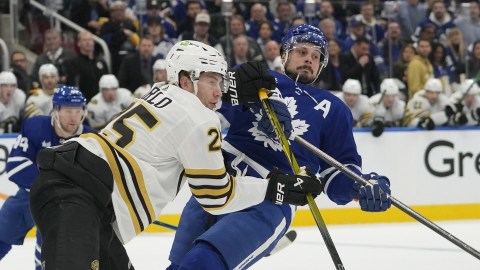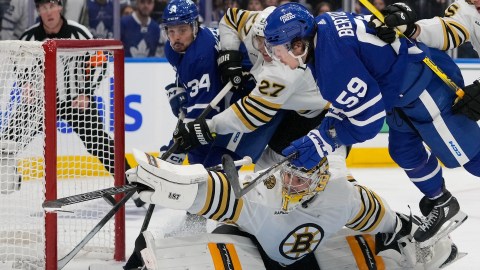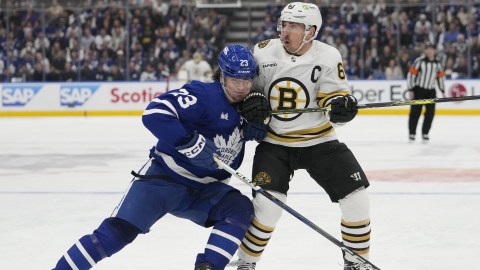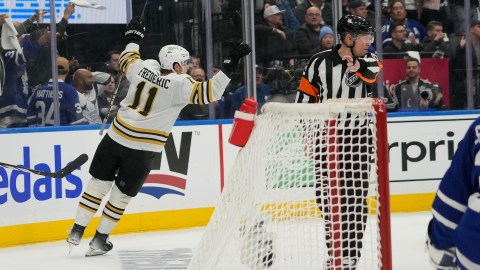The Bruins accomplished something truly historic this spring.
It wasn't just that they won their first Stanley Cup in 39 years, it was that they did so with virtually no production from their power play.
The Bruins dominated play at even strength, scoring 62 goals at 5-on-5 in the playoffs (Tampa Bay was a distant second in that category with 37). But given the man-advantage, Boston was beyond inept. The Bruins had just 10 goals on 88 power-play chances in the playoffs, a success rate of 11.4 percent.
To put that in perspective, Florida was dead last in the NHL on the power play during the regular season, and the Panthers still managed to convert 13.1 percent of their chances.
With the way special teams have come to dominate games with the rule changes introduced after the owners' lockout, teams aren't supposed to be able to succeed without a potent power play. The five previous Cup winners in the post-lockout era were a combined 20.3 percent on the power play, with Carolina in 2006 (24.0 percent), Pittsburgh in 2009 (20.6 percent) and Chicago in 2010 (22.5 percent) all close to doubling Boston's success rate this spring.
Each round, that Achilles' heel was supposed to be exposed so much that it would lead to an early Bruins exit. But the Habs couldn't beat the Bruins even as Boston was 0-for-21 in that series. Philadelphia got swept away even with the Bruins going just 2-for-16. Tampa Bay came close, holding Boston to 3-for-24, but a penalty-free Game 7 helped Boston's cause there. And the Bruins were actually a respectable 5-for-27 (18.5 percent) in the Final, turning the tables on the Canucks, whose woeful 2-for-33 showing on the power play was a big part of their demise.
Still, even with their shiny new Cup raised high, the Bruins know they can't afford to continue to flounder on the power play next season. The playoff struggles took things to extremes, but Boston's power-play problems were an ongoing concern all of last year. The Bruins finished the regular season ranked 20th at 16.2 percent, with their 43 power-play goals 26th in the league and their 265 power-play opportunities 27th.
The Bruins thought they were addressing that shortcoming at the trade deadline when they acquired Tomas Kaberle to serve as the club's new power play quarterback. But the Bruins were even worse with Kaberle, going just 17-for-154 on the power play (11.0 percent) in 49 games with Kaberle in the lineup between the regular season and playoffs.
Kaberle won't be back this season. The Bruins let him test the free-agent waters and he signed with Carolina. Replacing him will be Joe Corvo, who became expendable in Carolina after the Hurricanes added Kaberle and was traded to Boston for a fourth-round pick. Corvo will add a different dimension to the power play with a potent shot he's not shy about unleashing. That's a marked contrast from Kaberle's pass-first (and often seemingly pass-only) approach.
Corvo had more than half of his 40 points on the power play last year with 5-18-23 totals with the man advantage. The entire Bruins defense managed just 10 power-play goals last year, with Zdeno Chara accounting for eight and leading the club's blueliners with 15 power-play points.
Corvo's addition should help to punch up the power play, but others will need to step up as well. David Krejci managed just 1-11-12 totals on the power play despite averaging 2:41 a game of power-play ice time, second among Bruins forwards. Milan Lucic (five power-play goals) and Nathan Horton (six power-play goals) also need to do more to create the kind of traffic in front with the man advantage that helped them excel at even strength.
There should be some new blood up front as well. Michael Ryder (2:05 a game of power-play ice time, team-high eight power-play goals) has moved on to Dallas and Mark Recchi (2:41 power-play ice time, six power-play goals) has retired. That should open up opportunities for talented youngsters like Tyler Seguin (1:21 power-play ice time) and Brad Marchand (0:32 power-play ice time) to get more chances with the extra man.
Coach Claude Julien has faced plenty of criticism for the unit's lack of success, coming under fire for both his unwillingness to change things up and also for the more unorthodox tactics he has employed at times, such as putting Chara in front of the net and using Gregory Campbell down low at one point in the Cup Final. But it also has to be acknowledged that Julien's system has produced power-play success as well. The Bruins did finish fourth in the league at 23.6 percent in 2008-09, and Boston's power play clicked at a 24.4 percent success rate in the 2010 playoffs.
With a track record of past success and enough talent to produce results again, Boston's power play shouldn't be written off as a lost cause going into next season. But the Bruins do have to find a way to be more consistently productive with the man advantage, or they might not be able to avoid seeing the losses pile up this time around.
NESN.com Bruins beat writer Douglas Flynn will be answering one question facing the Bruins this offseason each day until Aug. 8.
Monday, July 18: Who will replace the leadership lost with Mark Recchi's retirement?
Wednesday, July 20: Can Tim Thomas maintain his Vezina-winning level of play for another season?



